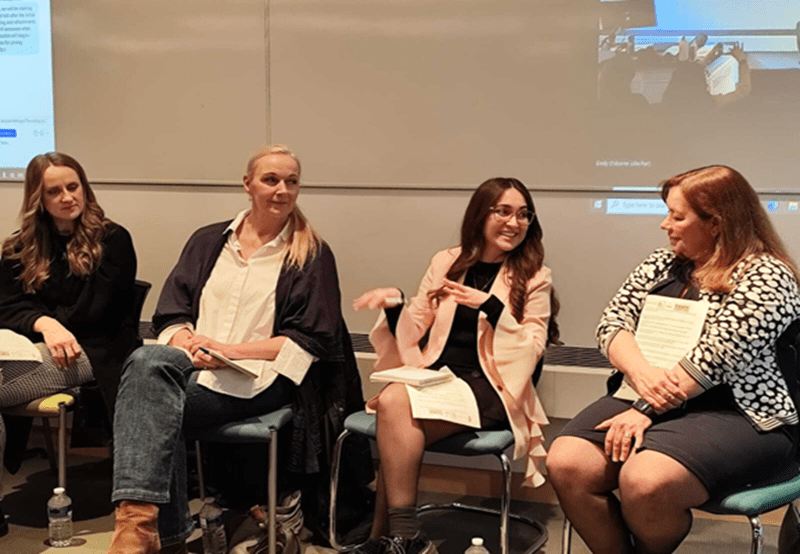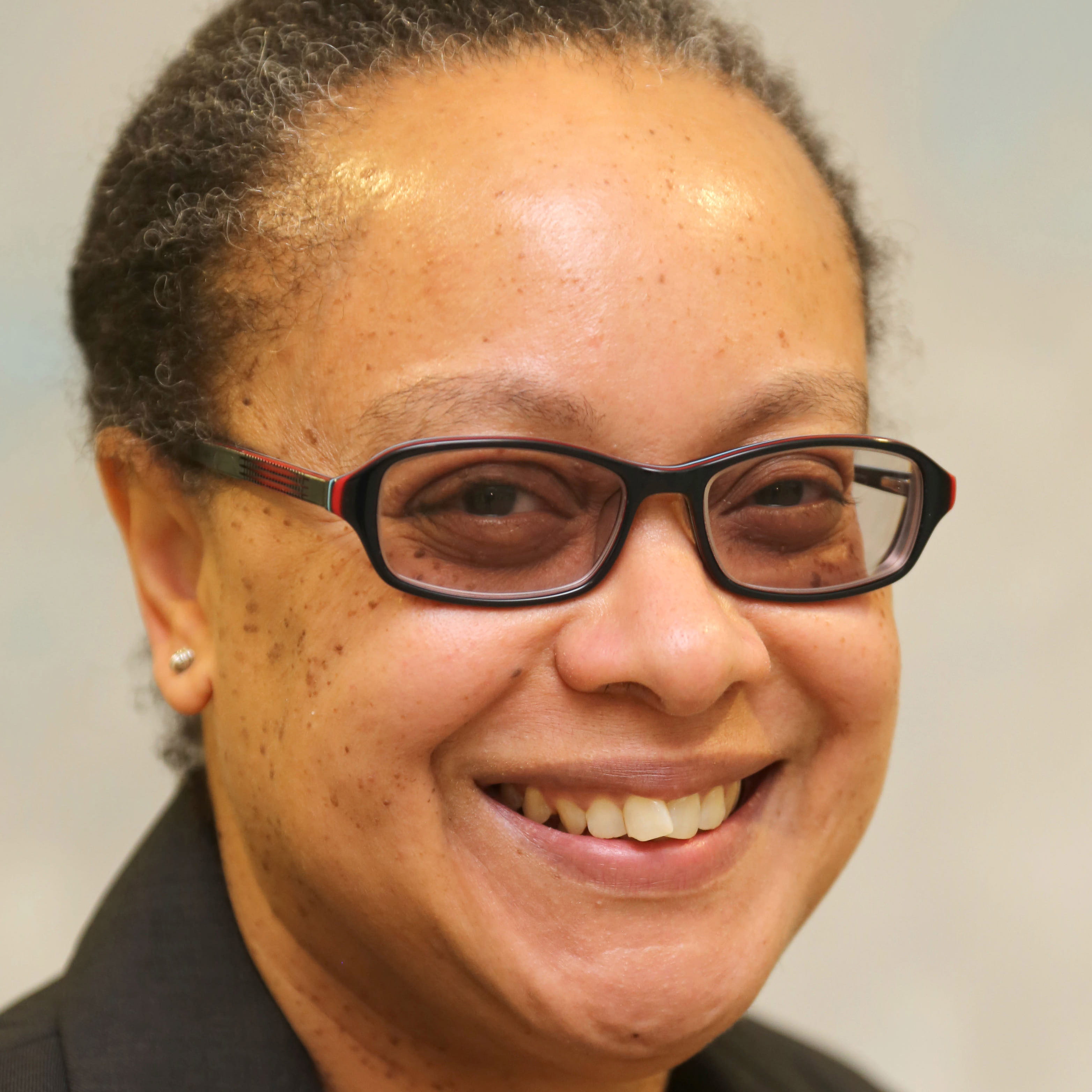Welcome to our Summer Term Essex Business School (EBS) Equality, Diversity and Inclusion (EDI) newsletter. Our newsletters provide an opportunity to raise awareness of EDI related issues and keep staff posted on current developments, activities and action on EDI in the School.

The EBS-Essex Start-Ups International Women’s Day 2025 event panel members, from left to right: Emma Swan (Founder and Director of Thrive Safe), Dr Ritta Husted (Coach and Senior Lecturer in Essex Pathways), Cami Valenzuela (Entrepreneur and founder of BeLingual), Dr Christina Ferreira (Senior Lecturer in Management & Marketing, Essex Business School).
We had a busy period of EDI activity in EBS during Spring Term. In February there was a showcase seminar organised by the Centre for Intimate and Sexual Citizenship (CISC), Department of Sociology and Criminology, in cooperation with our Athena Swan Essex Business School team, as part of UK LGBT+ History awareness activities. The EBS input into the event organisation was led by Professor Phoebe Moore who is the new EBS LGBTQ+ Champion. The speaker was Dr Olimpia Burchiellaro (EBS Senior Lecturer in Management) who gave a talk entitled ‘What is the value of queer? Gentrification and other queer utopias’. She discussed how Queerness’ emancipatory potential is increasingly being co-opted and folded into various kinds of violent capital-accumulating projects. Drawing from ethnographic fieldwork conducted on queer spaces in London and Buenos Aires, the seminar explored the ways in which queerness lubricates gentrification in urban space, focusing on the labour that queers and queer spaces perform in these contexts, the value they generate, and for whom. The seminar also sketched avenues for unlocking queerness’ more utopian capacities, envisioning ways to nurture its potential in the making of alternative possible worlds and forms of value/valuing.
On 4th March, in the lead up to International Women’s Day 2025, we had a talk by Professor Ilaria Boncori (EBS) which shared insights from her pathbreaking collaborative research project on Supporting Early Pregnancy Endings in the Workplace. Ilaria provided insights to some of the challenges including lack of awareness, concerns about disclosure, variable reactions and support, and differences in entitlements. Her talk showcased the value of research in supporting much needed, evidence-based, social change. The project is now in an impact phase and we look forward to hearing more about the on-going work to change workplace culture and practice in this area.
The next day we had an International Women’s Day panel event, this year jointly organised by EBS and Essex Start-ups, on “How to harness a better life-work balance, and what this means as a 21st century woman”. Again we had a great panel of speakers bringing together academics and entrepreneurs. This newsletter features a blog by postgraduate research student Celine Okoroma-Vincent, who shares her reflections on learning from the event.
Read the blog
Later in March we had a Neurodiversity Celebration Week event. This provided an opportunity for Essex students and staff to come together for a constructive discussion of neurodiversity. This was done with a view to raising awareness and supporting greater neuro-inclusion at the University and to celebrate neurodiversity. A main feature of the event was a panel discussion, with a great line-up of internal and external speakers. This included:
- Karen Bowlby (Inclusion Manager, People & Culture, University of Essex)
- Dr Raysa Rocha (Lecturer in Organisation Studies and HRM, Essex Business School)
- Professor Almuth McDowell (Professor of Organisational Psychology, Birkbeck University of London)
- Emma Young (Employer Engagement Lead, Inclusive Employment)
- Lisa Hanlon (Disability Officer, Technological University of the Shannon, Midlands, Ireland)
- Broze O’Donovan (Disability Officer, Technological University of the Shannon, Midwest, Ireland)
The Panel Chair was Rachel Watson (Professional Services, Essex Business School, and Chair of the new University of Essex Neurodiversity Staff Forum). A number of pertinent themes were explored, for example reflecting on the degree of support that we provide to neurodiverse staff and students, considering the unique contributions made by neurodiverse people and also whether we place too much onus on neurodiverse staff and students to ask for changes to be made to ensure they are not put at a disadvantage. The session closed by asking panel members to provide their top tips for improving HE culture around neurodiversity. To quote extracts from some of the tips provided:
“I would say that the first step, alongside awareness would be empathy, compassion, and respect, as it is with all our intersectional identities”.
“Everyone has a group of people or a class or a team that they have a voice in and I think it starts there. I think that's where cultural change starts in terms of addressing assumptions or being open”.
“One simple adjustment that all of us can make that is good for absolutely everyone, and where we do pretty badly across the sector in universities, is being really simple, clear, and unambiguous in all of our communication. But every time I see one of those corporate emails that is that long, and it's about everything in the kitchen sink, I just want to run the other way. So keeping our communication really simple, really unambiguous, making it really clear is this for information only? Do I expect you to do something if I expect you to do something. What is it that you actually need to do? When do I need it by? That is such a simple adjustment. But it would actually make the world of work and education a lot more neuro-inclusive”.
“If I could speak directly to academics, I would suggest that they approach their classroom as though 25 to 30 per cent of the students are neurodiverse. And that is just the reality. And it's not the exception. It's the rule. So that then speaks to Universal Design for Learning, and ensuring that all of your materials are designed properly to suit that 25 to 30 per cent at all times”.
Universal Design for Learning is an educational framework which emphasises inclusive learning in seeking to enhance teaching and learning for all individuals. This approach is underpinned by research in learning theory and cognitive neuroscience, promoting flexible learning environments. That flexibility helps to accommodate diverse learning differences, providing all students with equal opportunities to succeed. It addresses the practicalities of offering diverse ways to access material, interact with content, and demonstrate knowledge and understanding.
Our second newsletter blog is by one of our panel members, Raysa Rocha, who in celebration of Neurodiversity Awareness Month has written a blog to praise the unique contributions that neurodivergent academics bring to our higher education (HE) institutions, while also highlighting specific challenges that HE environments provide for neurodivergent scholars.
Read the blog
Finally, our third newsletter blog seeks to contribute to awareness raising on University of Essex support available for staff with caring responsibilities.
Read the blog
If you have any suggestions for future EDI-related events, would like to offer a blog for the next EBS EDI newsletter or are interested in getting involved in EDI at Essex Business School and would like advice on how to do so, please do contact me at mhudson@essex.ac.uk.
Best wishes,
Maria Hudson, Essex Business School Director of EDI



